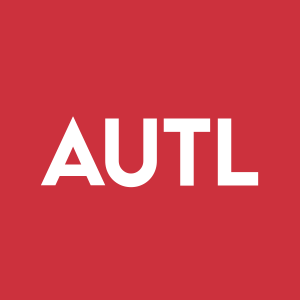Autolus Therapeutics announces publication in Nature Communications
LONDON, Feb. 22, 2024 (GLOBE NEWSWIRE) -- Autolus Therapeutics plc (Nasdaq: AUTL), a clinical-stage biopharmaceutical company developing next-generation programmed T cell therapies, today announces a publication in Nature Communications entitled: ‘Structure-Guided Engineering of Immunotherapies Targeting TRBC1 and TRBC2 in T Cell Malignancies.’1
In contrast to B cell lymphomas, T cell lymphomas have not benefited from immunotherapies such as therapeutic antibodies or CAR T cell therapies. This is because suitable surface target antigens are lacking. Immunotherapies for B cell lymphomas target pan B cell antigens, however an equivalent strategy targeting pan T cell antigens would lead to unacceptable immunosuppression.
Nearly all T cell lymphomas express the αβ T-cell receptor (TCRαβ). There are two types of TCRαβ - TRBC1 and TRBC2. While normal T cells are a mixture of approximately
The targetable difference between TRBC1 and TRBC2 is very small – merely a 2 amino acid inversion. In this publication, the research team at Autolus first describe the structural basis for selective AUTO4 CAR recognition of TRBC1. This structure shows that some amino acid residues stabilize the interaction with the TCR generally, while others result in selectivity. By exploiting this structure, the research team used in silico design and phage display to flip selectivity of the AUTO4 binder from TRBC1 to TRBC2 to generate AUTO5, a TRBC2-specific CAR T cell therapeutic.
“The development of a TRBC2-specific therapeutic by in silico design is a tour-de-force of structural biology and protein engineering from the research team at Autolus,” said Dr Martin Pule Chief Scientific Officer and founder of Autolus. “T cell malignancies are a neglected clinical area and the development of AUTO5 along with AUTO4 could allow us to develop a broad therapeutic approach that exploits TRBC1/2 TCR biology.”
References:
1. Ferrari et al, Structure-guided engineering of immunotherapies targeting TRBC1 and TRBC2 in T cell malignancies. Nat Commun 15, 1583 (2024) | doi: 10.1038/s41467-024-45854-3
2. Maciocia et al, Targeting the T cell receptor β-chain constant region for immunotherapy of T cell malignancies. Nat Med 23, 1416–1423 (2017) | doi: 10.1038/nm.4444
3. Cwynarski et al, First in human study of AUTO4, a TRBC1-Targeting CAR T cell therapy in refractory T cell lymphoma. Hematol Oncol 41, 80–81 (2023) | doi: 10.1002/hon.3163_44
About Autolus Therapeutics plc
Autolus is a clinical-stage biopharmaceutical company developing next-generation, programmed T cell therapies for the treatment of cancer and autoimmune disease. Using a broad suite of proprietary and modular T cell programming technologies, the Company is engineering precisely targeted, controlled and highly active T cell therapies that are designed to better recognize target cells, break down their defense mechanisms and eliminate these cells. Autolus has a pipeline of product candidates in development for the treatment of hematological malignancies, solid tumors and autoimmune diseases. For more information, please visit www.autolus.com.
Forward-Looking Statements
This press release contains forward-looking statements within the meaning of the "safe harbor" provisions of the Private Securities Litigation Reform Act of 1995. Forward-looking statements are statements that are not historical facts, and in some cases can be identified by terms such as "may," "will," "could," "expects," "plans," "anticipates," and "believes." These statements include, but are not limited to, statements regarding Autolus’ development of its product candidates. Any forward-looking statements are based on management's current views and assumptions and involve risks and uncertainties that could cause actual results, performance, or events to differ materially from those expressed or implied in such statements. These risks and uncertainties include, but are not limited to, the risks that Autolus’ preclinical or clinical programs do not advance or result in approved products on a timely or cost effective basis or at all; the results of early clinical trials are not always being predictive of future results; the cost, timing and results of clinical trials; that many product candidates do not become approved drugs on a timely or cost effective basis or at all; the ability to enroll patients in clinical trials; and possible safety and efficacy concerns. For a discussion of other risks and uncertainties, and other important factors, any of which could cause Autolus’ actual results to differ from those contained in the forward-looking statements, see the section titled "Risk Factors" in Autolus' Annual Report on Form 20-F filed with the Securities and Exchange Commission, or the SEC, on March 7, 2023 and in Autolus' Quarterly Report on Form 10-Q filed with the Securities and Exchange Commission on November 9, 2023, as well as discussions of potential risks, uncertainties, and other important factors in Autolus' subsequent filings with the Securities and Exchange Commission. All information in this press release is as of the date of the release, and Autolus undertakes no obligation to publicly update any forward-looking statement, whether as a result of new information, future events, or otherwise, except as required by law. You should, therefore, not rely on these forward-looking statements as representing Autolus’ views as of any date subsequent to the date of this press release.
Contact:
Olivia Manser
+44 (0) 7780 471568
o.manser@autolus.com
Julia Wilson
+44 (0) 7818 430877
j.wilson@autolus.com
Susan A. Noonan
S.A. Noonan Communications
+1-917-513-5303
susan@sanoonan.com
Lauren Williams
Investase
+44 23 9438 7760
lauren@investase.com








